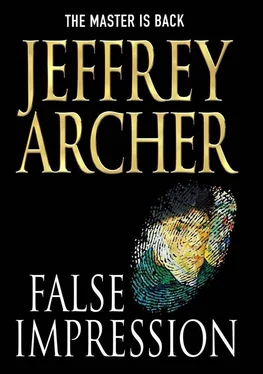“But that’s the point,” said Anna. “Once the overdraft has been cleared, the Wentworth estate can sell the painting to whomever they wish.”
Mr. Nakamura nodded. “Assuming that I accept your version of events, and if I was still interested in purchasing the Self-Portrait , I would want to make some conditions of my own.”
Anna nodded.
“First, the painting would have to be purchased directly from Lady Arabella, and only after legal tenure had been properly established.”
“I can see no objection to that,” said Anna.
“Second, I would expect the work to be authenticated by the Van Gogh Museum in Amsterdam.”
“That causes me no problems,” said Anna.
“Then perhaps my third condition will cause you a problem,” said Nakamura, “and that is the price I am willing to pay, as I do believe that I am, to use that ghastly but appropriate American expression, in the driving seat.”
Anna nodded her reluctant agreement.
“If, and I repeat if, you are able to meet my other conditions, I am happy to offer, for the Wentworth Van Gogh Self-Portrait with Bandaged Ear , fifty million dollars, which I have worked out will not only clear Lady Arabella’s debt but leave enough over to cover any taxes.”
“But it could come under the hammer for seventy, even eighty million,” Anna protested.
“That assumes you are not hammered long before then,” Nakamura replied. “I apologize,” he added immediately. “You have discovered my weakness for bad puns.” He smiled for the first time. “However, I am advised that Mr. Fenston has recently issued a bankruptcy order against your client, and knowing the Americans as I do, it might be years before any legal action can be settled, and my London lawyers confirm that Lady Arabella is in no position to consider the crippling legal costs such a lengthy process would undoubtedly incur.”
Anna took a deep breath. “If, and I repeat if” — Nakamura had the grace to smile — “I accept your terms, in return I would expect some gesture of goodwill.”
“And what do you have in mind?”
“You will place 10 percent, five million dollars, in escrow with Lady Arabella’s solicitors in London, to be returned if you do not wish to purchase the original.”
Nakamura shook his head. “No, Dr. Petrescu, I am unable to accept your gesture of goodwill.”
Anna felt deflated.
“However, I am willing to place five million in escrow with my London lawyers, the full amount to be paid on exchange of contracts.”
“Thank you,” said Anna, unable to disguise a sigh of relief.
But Nakamura continued. “Having accepted your terms, I would also expect some gesture of goodwill in return,” he said as he rose from behind his desk. Anna rose nervously. “Should the deal go through, you will give serious consideration to taking up the appointment as the CEO of my foundation.”
Anna smiled but did not bow. She offered her hand and said, “To use another ghastly but appropriate American expression, Mr. Nakamura, we have a deal.” She turned to leave.
“And one more thing before you go,” said Nakamura, picking up an envelope from his desk. Anna turned back, hoping she didn’t look apprehensive. “Would you be kind enough to pass on this letter to Miss Danuta Sekalska, a huge talent that I can only hope will be allowed to mature.” Anna smiled as the chairman accompanied her down the corridor and back to the waiting limousine. They chatted about the tragic events in New York, and the long-term consequences for America. However, Nakamura made no reference to why his regular driver was in hospital recovering from serious injuries, not least to his pride.
But then the Japanese have always considered that some secrets are best kept in the family.
Whenever Jack was in a strange city, he rarely informed the embassy of his presence. They always asked too many questions he didn’t want to answer. Tokyo was no exception, but he did need some of his own questions answered, and he knew exactly who to ask.
A con man, whom Jack had put behind bars for several years, once told him that whenever you’re abroad and in need of information, book yourself into a good hotel. But don’t seek advice from the manager and don’t bother with the receptionist; only deal with the head concierge. Information is how he makes his living; his salary is incidental.
For fifty dollars, Jack learnt everything he needed to know about Mr. Nakamura, even his golf handicap — fourteen.
Krantz watched as Petrescu emerged from the building and climbed back into the chairman’s limousine. She quickly hailed a taxi and asked to be dropped a hundred yards from the Seiyo hotel. If Petrescu was about to depart, she would still have to retrieve her luggage and settle the bill.
Once the temporary chauffeur had dropped Anna back at the Seiyo, she couldn’t wait to check out — she picked up her key from reception and ran up the stairs to her room on the first floor. She sat on the end of the bed and called Arabella first. She sounded wide awake.
“A veritable Portia,” was Arabella’s final comment after she had learned the news. Which Portia, Anna wondered, Shylock’s nemesis, or Brutus’s wife? She unclasped her gold chain, unfastened the leather belt, kicked off her shoes, and finally slipped out of her dress. She exchanged her more formal attire for a T-shirt, jeans, and sneakers. Although checkout was at noon, she still had enough time to make one more call. Anna needed to plant the clue.
The ringing tone continued for some time before a sleepy voice answered.
“Who’s this?”
“Vincent.”
“Christ, what time is it? I must have fallen asleep.”
“You can go back to sleep after you’ve heard my news.”
“You’ve sold the painting?”
“How did you guess?”
“How much?”
“Enough.”
“Congratulations. So where are you going next?”
“To pick it up.”
“And where’s that?”
“Where it’s always been. Go back to sleep.”
The phone went dead.
Tina smiled as she drifted back to sleep. Fenston was going to be beaten at his own game for once.
“Oh, my God,” she said out loud, suddenly wide awake.
“I didn’t warn her that the stalker is a woman and knows she’s in Tokyo.”
Fenston stretched an arm across the bed and fumbled for the phone as he tried to keep his eyes shut.
“Who the fuck is this?”
“Vincent’s just made a call.”
“And where was she calling from this time?” asked Fenston, his eyes suddenly wide open.
“Tokyo.”
“So she must have seen Nakamura.”
“Sure has,” said Leapman, “and claims she’s sold the painting.”
“You can’t sell something that you don’t own,” said Fenston, as he switched on the bedside light. “Did she say where she was going next?”
“To pick it up.”
“Did she give any clue as to where that might be?”
“Where it’s always been,” replied Leapman.
“Then it has to be in London,” said Fenston.
“How can you be so sure?” asked Leapman.
“Because if she had taken the painting to Bucharest, why not take it on to Tokyo? No, she left the picture in London,” said Fenston adamantly, “where it’s always been.”
“I’m not so sure,” said Leapman.
“Then where do you think it is?”
“In Bucharest, where it’s always been , in the red box.”
“No, the box was just a decoy.”
“Then how can we ever hope to find the painting?” asked Leapman.
“That will be simple enough,” said Fenston. Now that Petrescu thinks she’s sold the painting to Nakamura, her next stop will be to pick it up. And this time Krantz will be waiting for her, and then she’ll end up having something in common with Van Gogh. But before then, there’s another call I have to make.’ He slammed the phone down before Leapman had a chance to ask to whom.
Читать дальше












